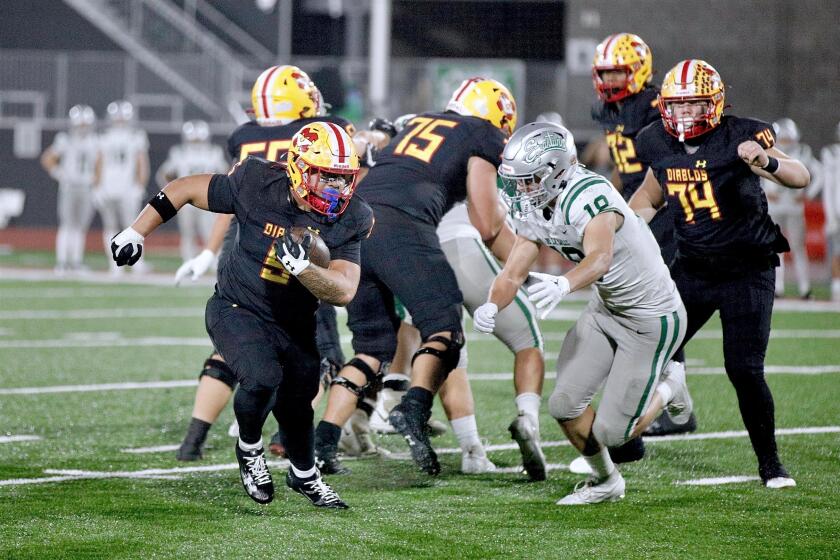Amid Good News, L.A. Gets a Pie in the Face
So Los Angeles can have itself a new pro football team, if it only can pony up the money and settle other details by September. Is that good news? Sports columnists, at least, say it is.
Other reactions were more subdued. One insider at New Coliseum Ventures, the leading group to bring pro football back to L.A., says, “There’s a lot left to do.”
The National Football League’s announcement Tuesday was more than a month late. NFL owners had promised last year to give the word on who was to get the next expansion franchise by Feb. 11. But the city has learned to take a lot of guff from this small, elite club of bizarrely rich men.
Also last week, we learned that Los Angeles will host its first Democratic convention in 40 years, further authentication of L.A.’s standing among U.S. cities and its growth and strength. Never mind that the city faces the increasing threat of a breakup from a peevish San Fernando Valley minority. Such a fission would again make Chicago, which has an NFL team, America’s second city.
Like grand opera, pro football has long had something of an ephemeral presence in this town, coming in with great enthusiasm and usually departing rather abruptly, with appropriate finger-pointing and resentment. The Dodgers and the Chargers showed up roughly at the same time, but while one has become a central institution in Los Angeles, knowledge that the football team was ever based here is exotic trivia.
The NFL announcement and word of the convention siting have something in common, historically speaking. They mark an uneven 40 years of L.A’s drive to be taken seriously as the kind of great city that has traditions and loyalties, along with tall buildings. A presidential convention, an NFL team--these items are at the top of any true-cityhood checklist. We had them both 39 years ago, when Democrats in Los Angeles nominated John F. Kennedy for president and the Rams played at the Coliseum. Now we almost have them again. But isn’t it just like Los Angeles, as it steps into the double media spotlight, to be blindsided by the custard pie of the Valley secession study: Hey, guess what? It’s not just most New Yorkers who hate L.A. Roughly 7% of some of the city’s more affluent voters apparently do, too.
Will a pro football team’s reappearance after five NFL-free years ease the social pain and help unite Southland society, the way that American Legion baseball was supposed to stifle social discontent during the Depression? Will the new team somehow keep the Valley from seceding? Will its prospect facilitate passage of a new city charter in June? For that matter, will the imminence of national politics’ quadrennial main event do the same?
Who can really say, but why should either overhyped development make any difference? Both the new Staples Center and a revamped Coliseum will be as accessible to the Valley as they are now, whatever the size of this city. Let’s also recall that there’s still a chance that the NFL nod could go to Michael Ovitz’s proposed “freeway close” Hacienda Stadium in Carson.
Although the NFL hasn’t ruled out Carson, that proposal is more iffy, if only because Ovitz lacks the depth of support that master builder Eli Broad’s and Ed Roski’s New Coliseum Ventures has mustered, while in Councilman Mark Ridley-Thomas, the Coliseum proposal has a political backer savvier than all Carson’s City Council members put together.
Late last week, there were indications that the competing NFL proposals might fold into a single Coliseum project. But even if the new football team ended up in Carson, it would still be L.A.’s team. After all, no one ever referred to a certain formerly local team as the Anaheim Rams despite its 15 years in Orange County.
Los Angeles is now, more than ever before, the common denominator of the region, not just of what lies within its formal urban boundaries. It lies at the center of the entire world’s insatiable appetite for the new and unexpected. Whatever its precise geographical limits, what one might call Global Los Angeles is the dense, stellar body that lures the extravagant, the flamboyant and the supersalaried--in the arts, entertainment and, if the distinction is valid, sports. If the Valley splits off from Los Angeles, it will soon discover it’s easier to distance itself from the oversight of City Hall than from the city’s spiritual identity.
And if Valley football fans want to watch live pro sports, they’ll have to either inch south along the 101 or crowd onto the Red Line toward that loathsome downtown, from whose political clutches they seem so desperate to escape. Thus, Los Angeles, even shorn of one-third of its housing stock, wins again.
More to Read
Go beyond the scoreboard
Get the latest on L.A.'s teams in the daily Sports Report newsletter.
You may occasionally receive promotional content from the Los Angeles Times.










